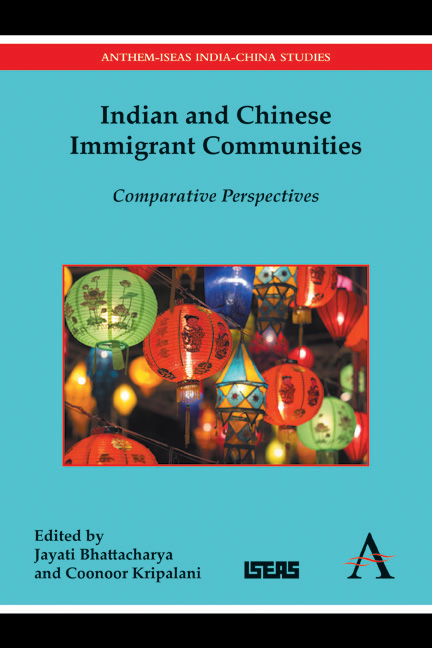Book contents
- Frontmatter
- Contents
- Foreword
- Acknowledgements
- Introduction
- Section I Historical Antecedents and the Question of Nationality
- Section II The Meeting Ground: Indians and Chinese in Southeast Asia
- Section III Indians in China and Chinese in India
- Section IV Across the Globe: Indian and Chinese Diasporas
- 15 Overseas Indian and Chinese Communities in Film: Defining Identities through Popular Hindi Film and Transnational Chinese and Indian Films, 1990s Onwards
- 16 The “Other” NRIs: The Case of Low-Wage Indian Migrants in the Gulf
- Postscript Shifting Worlds and Changing Identities: The Reshaping of the Chinese-Indian Communities in India after the 1962 “Sino-Indian Incident”
- List of Contributors
- Index
16 - The “Other” NRIs: The Case of Low-Wage Indian Migrants in the Gulf
from Section IV - Across the Globe: Indian and Chinese Diasporas
Published online by Cambridge University Press: 05 December 2015
- Frontmatter
- Contents
- Foreword
- Acknowledgements
- Introduction
- Section I Historical Antecedents and the Question of Nationality
- Section II The Meeting Ground: Indians and Chinese in Southeast Asia
- Section III Indians in China and Chinese in India
- Section IV Across the Globe: Indian and Chinese Diasporas
- 15 Overseas Indian and Chinese Communities in Film: Defining Identities through Popular Hindi Film and Transnational Chinese and Indian Films, 1990s Onwards
- 16 The “Other” NRIs: The Case of Low-Wage Indian Migrants in the Gulf
- Postscript Shifting Worlds and Changing Identities: The Reshaping of the Chinese-Indian Communities in India after the 1962 “Sino-Indian Incident”
- List of Contributors
- Index
Summary
The Indian state's relationship with its overseas residents has been extensively theorized. This literature primarily addresses the significance of remittances and knowledge, which are channelled back to the homeland through its middle-class NRIs (non-resident Indians). In these formulations, low-wage migrants are often left out. Analysis of low-wage migrants' relationship to India is instead limited to macroeconomic formulations at village/state levels, anthropological accounts of reintegration and quotidian experiences of living abroad. Their relationship as transnational subjects caught between regimes of sending and receiving countries has yet to be effectively addressed. Based on fieldwork conducted in Dubai in 2008, this paper demonstrates that this group is largely excluded from initiatives of non-resident citizen benefits, while constructed primarily as empowered free agents in a capitalist global economy. This results in a situation where neo-liberal markets are assumed to effectively regulate labour, and sending and receiving nations abdicate responsibility for ensuring rights and welfare of the migrant. However, both countries continue to reap economic benefits of their labour as productive subjects.
Introduction
In current academic as well as popular and media discourses, much has been made of India's recent “rise.” In addition to the subcontinent's rapid economic growth, significant attention has been paid to ethnic Indians living outside the country's borders while contributing to its cultural as well as economic influence. With an estimated twenty million people of Indian origin living outside the country today, their relevance in developing understandings of the Indian nation-state as well as of transnational communities should not be overlooked. This research, in bringing those two elements together, shows that the Indian state is often discriminatory in providing for the welfare of its overseas citizens. While middle-class NRIs are courted through investment policies and visa categories to maintain cultural and economic links with the motherland, the less privileged migrant is relatively neglected in terms of welfare and rights provisions.
- Type
- Chapter
- Information
- Indian and Chinese Immigrant CommunitiesComparative Perspectives, pp. 257 - 280Publisher: Anthem PressPrint publication year: 2015



